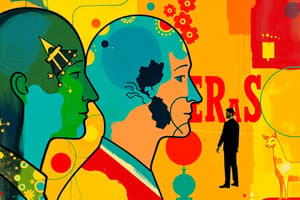Podcast
Questions and Answers
What is the primary focus of leadership according to the definitions provided?
What is the primary focus of leadership according to the definitions provided?
- Getting results through people (correct)
- Implementing organizational policies
- Achieving individual success
- Managing resources efficiently
The political function of leadership pertains to how leaders interact with their followers.
The political function of leadership pertains to how leaders interact with their followers.
False (B)
Name one of the major schools of thought in leadership theory.
Name one of the major schools of thought in leadership theory.
Trait Approach
Leaders create and sustain a performance ________.
Leaders create and sustain a performance ________.
Match the following leadership functions to their descriptions:
Match the following leadership functions to their descriptions:
According to House's Path Goal Theory, which of the following is NOT one of the four paths identified?
According to House's Path Goal Theory, which of the following is NOT one of the four paths identified?
Effective leaders according to Path Goal Theory assume a fixed leadership style.
Effective leaders according to Path Goal Theory assume a fixed leadership style.
What do effective leaders do to help followers achieve their goals according to House's Path Goal Theory?
What do effective leaders do to help followers achieve their goals according to House's Path Goal Theory?
The leadership style that focuses on motivating and inspiring workers through influencing rather than directing others is called __________ leadership.
The leadership style that focuses on motivating and inspiring workers through influencing rather than directing others is called __________ leadership.
Match the leadership styles with their descriptions:
Match the leadership styles with their descriptions:
Which of the following characteristics is NOT identified as a trait of great leaders?
Which of the following characteristics is NOT identified as a trait of great leaders?
Trait theories of leadership support the idea that leaders can only be made, not born.
Trait theories of leadership support the idea that leaders can only be made, not born.
What significant shift occurred in leadership theory starting in the 1940s?
What significant shift occurred in leadership theory starting in the 1940s?
The two basic styles of leadership behavior identified in the Ohio State studies are __________ and __________.
The two basic styles of leadership behavior identified in the Ohio State studies are __________ and __________.
Match the following leadership studies with their corresponding approaches:
Match the following leadership studies with their corresponding approaches:
What does employee-oriented leadership primarily emphasize?
What does employee-oriented leadership primarily emphasize?
Contingency Theory states that there is one most effective leadership style for all situations.
Contingency Theory states that there is one most effective leadership style for all situations.
What is Fiedler’s Least Preferred Co-worker scale used to measure?
What is Fiedler’s Least Preferred Co-worker scale used to measure?
A high LPC score indicates a leader has a ______ orientation.
A high LPC score indicates a leader has a ______ orientation.
Match the following leadership dimensions with their descriptions:
Match the following leadership dimensions with their descriptions:
What is one of the studies related to Contingency Theory?
What is one of the studies related to Contingency Theory?
Employee-oriented leaders tend to rate their least preferred co-worker more negatively.
Employee-oriented leaders tend to rate their least preferred co-worker more negatively.
What do leaders who are task motivated typically rate their LPC?
What do leaders who are task motivated typically rate their LPC?
Flashcards
Leadership definition
Leadership definition
Influencing others to achieve goals.
Leadership Functions (Task)
Leadership Functions (Task)
Ensuring task completion. Getting the job done.
Leadership Functions (Cultural)
Leadership Functions (Cultural)
Developing a positive work environment.
Leadership as a Trait
Leadership as a Trait
Signup and view all the flashcards
Leadership Styles (Contingency)
Leadership Styles (Contingency)
Signup and view all the flashcards
Trait Theory of Leadership
Trait Theory of Leadership
Signup and view all the flashcards
Behavioural Theories of Leadership
Behavioural Theories of Leadership
Signup and view all the flashcards
Ohio State Leadership Studies
Ohio State Leadership Studies
Signup and view all the flashcards
Considerate Style
Considerate Style
Signup and view all the flashcards
Initiating Structure
Initiating Structure
Signup and view all the flashcards
Path-Goal Theory
Path-Goal Theory
Signup and view all the flashcards
Directive Leadership
Directive Leadership
Signup and view all the flashcards
Supportive Leadership
Supportive Leadership
Signup and view all the flashcards
Participative Leadership
Participative Leadership
Signup and view all the flashcards
Transactional Leadership
Transactional Leadership
Signup and view all the flashcards
Production-oriented leadership
Production-oriented leadership
Signup and view all the flashcards
Employee-oriented leadership
Employee-oriented leadership
Signup and view all the flashcards
Contingency Theory
Contingency Theory
Signup and view all the flashcards
Fiedler's Least Preferred Coworker (LPC) score
Fiedler's Least Preferred Coworker (LPC) score
Signup and view all the flashcards
High LPC score
High LPC score
Signup and view all the flashcards
Low LPC score
Low LPC score
Signup and view all the flashcards
Blake and Mouton Grid
Blake and Mouton Grid
Signup and view all the flashcards
Leadership Styles
Leadership Styles
Signup and view all the flashcards
Study Notes
MG4031 Management Principles - Leadership
- Leadership is defined as the ability to effectively guide people towards achieving organizational goals.
- Leadership is a crucial management skill, enabling managers to motivate and inspire their teams.
- Effective leadership is about achieving results through people, with a focus on social influence and support.
Learning Objectives
- Understanding the centrality of leadership in organizational functioning is vital.
- Recognizing and appreciating the functions of a good leader is important.
- Learning about different leadership theories, particularly trait, behavioural, contingency and charismatic approaches, is crucial.
Key Leadership Functions
- Task: Includes task completion as a core function of leadership.
- Cultural: Creating and maintaining a positive work environment is a key leadership function.
- Symbolic: Leadership stands for values and represents the organization.
- Political: Navigating relationships with external stakeholders, like customers or government, is an aspect of leadership.
- Relational: The quality of relationships between leaders and followers significantly influences outcomes.
Different Leadership Schools of Thought
- The Trait Approach: Identifies inherent characteristics of effective leaders, suggesting some traits are inherent and not learned.
- The Behavioral Approach: Focuses on observable behaviors of leaders, emphasizing learnable leadership styles.
- The Contingency Approach: Highlights that the most effective leadership style varies depending on the situation, arguing there isn't one best way.
- The Charismatic Approach: Understands leadership from a motivational standpoint where leaders inspire and influence their teams better.
1. Trait Theories of Leadership
- Leaders are often considered born, not made, but these are early views of leadership.
- Great Man Theory suggests certain traits make leaders effective but debate continues on the importance of learned traits vs inherent ones.
- Leadership traits are diverse, including intelligence, dependability, maturity.
Characteristics Identified in Trait Studies
- Intelligence, initiative, dependability, lateral thinking ability, self-assuredness, maturity, visionary ability, need for achievement, need for power, goal-directedness were all identified as potential traits of effective leaders
Difficulties with Trait Theory
- The list of traits is potentially exhaustive, and even potentially infinite.
- The theory neglects the significance of nurture and environmental factors on leadership
- Doesn't often consider interactions between leaders and individuals within groups
2. Behavioural Theories of Leadership
- This theory proposes specific behaviors that distinguish leaders from non-leaders.
- Ohio State University Leadership Studies: Two key behaviors: initiating structure (planning, organizing, controlling) and consideration (status and well-being, creating a pleasant environment).
- University of Michigan Leadership Studies: Two key behaviours: production-oriented (focuses on technical and task elements) and employee-oriented (focuses on interpersonal relations.)
- Blake and Mouton Managerial Grid: A grid based on "concern for people" and "concern for production", which identifies several management styles, including impoverished, country club, team, task and middle-of-the-road.
3. Contingency Theory
- Leadership success is more complex than simply possessing certain traits or behaviours.
- Effective leadership varies based on the specific situation.
- Fiedler's Least Preferred Co-worker (LPC) Theory: Leader style (task or relationship-motivated) is crucial and is identified by rating a least preferred coworker on a scale (positive to negative) .
- House's Path-Goal Theory: Effective leaders clarify paths for goal achievement and reduce obstacles. This involves a range of styles: directive, supportive, participative, and achievement-oriented, which is suited to different situations.
4. Charismatic Leadership Theories
- Focuses on unique behaviours and characteristics of charismatic leaders, differentiating them from others.
- Transactional Leadership: Based on exchange relationships, with an emphasis on structuring the environment.
- Transformational Leadership: A focus on adjusting to values, beliefs and needs of followers, motivating and inspiring workers.
Studying That Suits You
Use AI to generate personalized quizzes and flashcards to suit your learning preferences.




